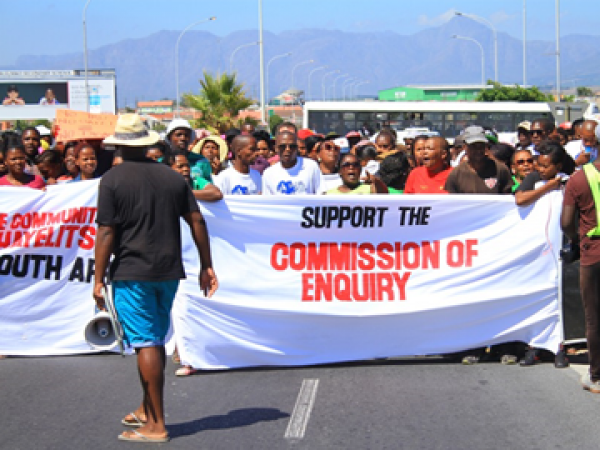

A march through Khayelitsha arranged by the SJC in support of the Khayelitsha Commission, 27 January. Photo by Dustin Kramer.
16 April 2014
The Social Justice Coalition is “delighted” at the progress of the Khayelitsha Commission of Inquiry into policing, said the coalition’s Joel Bregman.
The SJC was one of the organisations involved in the process that led to the formation of the Commission.
Bregman said the commissioners and evidence leaders had done “a brilliant job”. The quality and depth of evidence was noteworthy, he said, and the Commission had gained unprecedented access to large volumes of data and information about policing in Khayelitsha and in the country as a whole.
He expressed concern that Minister of Police Nathi Mthethwa and Police Commissioner Riah Phiyega have remained silent on the Commission, and have not attended. But he commended SAPS for cooperating with the Commission, after the year-long legal battle initiated by SAPS to block the establishment of the Commission.
Phase 1 of the hearings ended with testimony from Provincial Commissioner General Arno Lamoer. Bregman noted that the police had made some important concessions in terms of policing problems in Khayelitsha. In his closing remarks, Lamoer had promised an annual ‘check-up’ on policing in Khayelitsha, and a review after five years.
The SJC hoped the Commission’s recommendations would be geared towards short, medium and long term goals. Some improvements could be made quickly, especially at station level where procedures already existed but weren’t being implemented. This would build trust between the residents of Khayelitsha and the police. Medium and longer term changes might involve provincial or national issues and take more time.
However, Bregman cautioned against a result similar to the Khayelitsha Local Safety Plan issued by the CSIR in 2009, a document he said was too complex to be useful.
Meanwhile, the SJC would continue to assist individuals in Khayelitsha to ensure that they received adequate service from SAPS, though this was not ideal, he said.
During phase 2, from 12 to 16 May, the Commission will hear evidence from experts on policing. A list of issues has been drawn up based on evidence from community members, senior police officers and academics. Much of the information for this phase is available on the Commission Website, as are all the affidavits from phase 1.